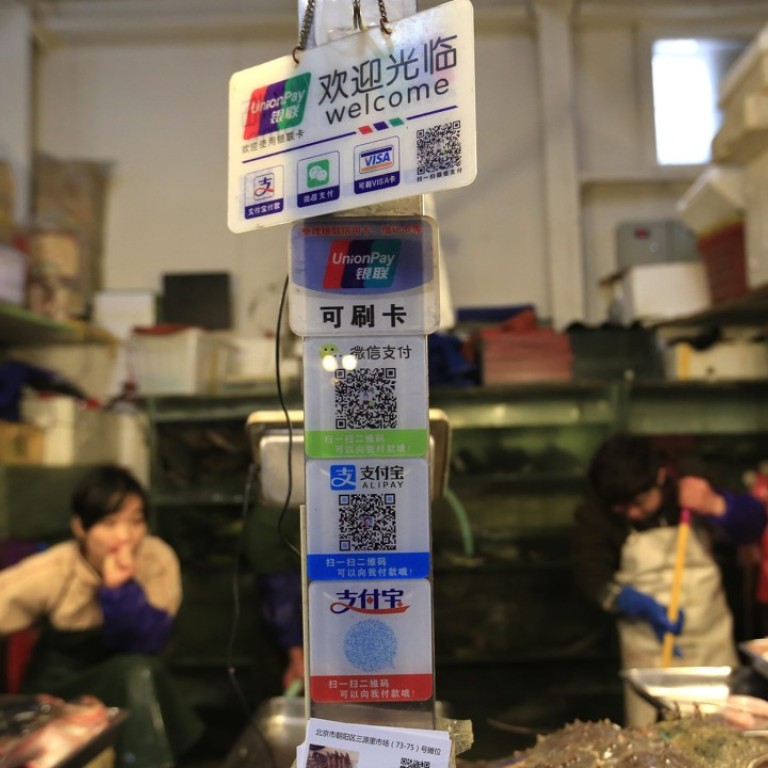
Mobile payments ‘to overtake credit cards’ as preferred ways to pay in online commerce by 2019
United Nations report notes the rapid growth of e-payment systems like Alipay and PayPal, and sees blockchain-based systems also rising in prominence
Online, mobile and digital currency payment systems are set to overtake credit and debit cards as the most popular ways to pay in e-commerce worldwide by 2019, a report by a United Nations body on international trade and development said on Tuesday.
The share of credit and debit cards in global payments is expected to drop to 46 per cent by 2019 from 51 per cent three years ago, the United Nations Conference on Trade and Development (UNCTAD) said in its “Information Economy Report 2017: Digitalisation, Trade and Development”, citing figures from payment processing company Worldpay.
So-called e-wallet systems like Alipay, run by Alibaba affiliate Ant Financial, and Tenpay, run by Alibaba rival Tencent, as well as the US-based PayPal service have spread rapidly, driven by the explosive growth of e-commerce.
In China alone, the size of the mobile payment market had reached 23 trillion yuan (US$3.5 trillion) by the end of the second quarter, up 22.5 per cent from the previous quarter, according to Analysys International, a Chinese internet research firm.
Alipay recently signed up coffee chain Starbucks to allow e-payment at all 2,800 Starbucks locations in China, while at a KFC fast food restaurant in China, diners can pay via Alipay using facial recognition technology.
The UNCTAD report said that in developed regions, digital payments are dominated by credit and debit cards, followed by e-wallets. But in some developing countries, where credit cards are rarely the most important payment method, new online and mobile payment methods are catching on.
It noted that in China, the preferred payment method for business to consumer e-commerce was Alipay, which is used by 68 per cent of all online shoppers in the country, while in Kenya, mobile money, or accessing financial services via a mobile phone, is more common than credit cards for e-commerce, although cash on delivery remains the main method.
For cross-border purchases, e-wallets appear to be “particularly popular” as a method of payment, the UNCTAD said.

Other surveys have noted the rise of e-payment systems.
In 2016, the International Post Corporation, an association of 24 national postal services, said that 41 per cent of e-commerce shoppers across 26 countries used e-wallets, while 33 per cent used credit cards and 18 per cent used debit cards or bank transfers.
Looking into the future, UNCTAD said in the report that payment systems based on distributed ledger technologies such as blockchain are likely to be more widely used.
“This technology can make online payments safe, and being peer-to-peer, it is less expensive than intermediated payment platforms,” the report said.
“While few internet users currently prefer this method of payment, it is gradually being adopted as it improves security, accelerates settlement, reduces the size of the minimum viable transaction and executes digitised versions of traditional contracts (so-called smart contracts).”
The properties of blockchain technology enable smaller cross-border transactions, including remittances, which would otherwise not be made due to high fixed costs or a lack of trust among parties, the report added.
Alibaba owns the South China Morning Post.

